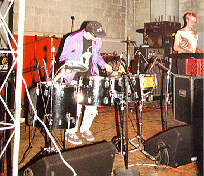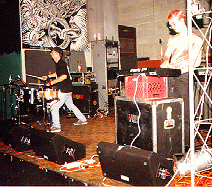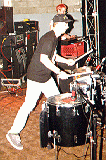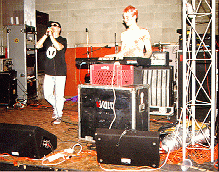

Jester: How did you get involved with 21st Circuitry after being an independent artist for such a long time?
Steve: We sent the label president Don Blanchard a tape around four years ago. I am not sure if he ever heard it but we never got a response. Peter Stone of Xorcist got our tape while he was doing the House of Usher club in San Francisco. One day he forced Don to listen to my tape at high volume in his car. He told Don that he should sign us, and Don agreed to give us a second chance. Don then came to our show that we did in San Francisco for the Cyberden benefit. He requested another tape afterwards and he signed us a short while later.
Jester: On the upcoming album, how much of it is new material as opposed to older material that you've sent out on various demo tapes before?
Phil: I'd say that maybe 25% is new.
Steve: New in the sense of maybe within the last year. 25% of it is a year old. Two of the songs are five years old. The two newest songs were written within the last six months. It is really a kind of compilation album because everything on it was recorded at different times with all different equipment. It all sounds very different.
Jester: What is your favorite lyric you've ever written?
Steve: I only started writing lyrics after our vocalist left the band. So I have only written the lyrics for two songs on the new album. There is a song on the CD that the old vocalist sang, 16 Volt is remixing that song for the final version on the album with my new lyrics and vocals on it. I like the line: "A fit of nothing, shot killed laughing, voice left hanging, dripping silence of the word."
Jester: Why did the vocalist leave the band?
 Steve: He just literally disappeared. The short version of
the story is that his girl friend broke up with him, he lost his job, he was
homeless for awhile, he lived with me for awhile, I got sick of him and kicked
him out. He disappeared and for awhile and then moved back in for a few months
until I kicked him out again. I guess he decided it was more important to do
crack and sell drugs than to make music. The last thing I heard from him was a
voice mail message that said, "Steve pick up! Pick up! Pick up! Well fuck you!"
So why he left I don't know. I used to write all the music and he wrote all the
lyrics, now I do everything. He was a very prolific writers with maybe 10%
quality material. I write very little and I hope that it is good. So, please
don't get any meaning out of the lyrics, they are just another instrument.
Steve: He just literally disappeared. The short version of
the story is that his girl friend broke up with him, he lost his job, he was
homeless for awhile, he lived with me for awhile, I got sick of him and kicked
him out. He disappeared and for awhile and then moved back in for a few months
until I kicked him out again. I guess he decided it was more important to do
crack and sell drugs than to make music. The last thing I heard from him was a
voice mail message that said, "Steve pick up! Pick up! Pick up! Well fuck you!"
So why he left I don't know. I used to write all the music and he wrote all the
lyrics, now I do everything. He was a very prolific writers with maybe 10%
quality material. I write very little and I hope that it is good. So, please
don't get any meaning out of the lyrics, they are just another instrument.
Jester: When you write music does anyone else help you now?
Steve: Phil does. However that is only relevant on the next album. On this album all the music has already been written and I am only incorporating him when we play live. We rewrote a bunch of the songs and added new material for the live show that I wish we could have included on this album but we didn't.
Jester: Do you play any songs that will not appear on the album when you play live?
Steve: Yes. We play two songs live that are not on the album that I hope to have on the next album. Some of the new songs I have written with the aid of the guitar which is totally different than the way I wrote on the older material.
Jester: How has that changed your song writing process?
Steve: Actually it hasn't changed my own process any because I still compose the track electronically and then I hand it to Phil and tell him to add something to it. I still write assuming that no one else is going to be involved. However if i am writing a song and it seems to need something that I cannot give to it, I will give it to Phil to help me out. There are other songs that he starts to write and then I am the one adding material to it. Phil coming up with material to start with is a new element. It is not collaborative but rather each of us working on our own to write the majority of the track and then taking it to the other members and asking for help in adding the finishing touches.
Jester: What types of music do you listen to that maybe influence you own music?
 Steve: At the moment I like selected hard core hip-hop
bands. I also really enjoy experimental ambient bands like Zoviet France. Also
Scorn and the Chemical Brothers.
Steve: At the moment I like selected hard core hip-hop
bands. I also really enjoy experimental ambient bands like Zoviet France. Also
Scorn and the Chemical Brothers.
Phil: I enjoy a little bit of everything. I like music with intensity. If IT is something with a strong focus and that contains some really beautiful elements then I will really enjoy it. If it seems to be kind of backward and evaporating then I don't like it.
Jester: Is there A certain type of musical element that you use when you sit down and compose a track?
Steve: The best songs all start with some type of sound structure. That could be a drum beat, guitar feedback, a percussion loop or a vocal sample. It is not like we write a song around that item but there are times when I can hear that single sound and then suddenly I can envision the rest of the song around it. The best song always is derived from a single sound that sparks the remainder of the tracks from within.
Jester: On the live line up do you play both drums and guitars?
Steve: Yes. Phil is on guitar, Jason is playing the sampler, and I play drums when I don't sing, and sing when I don't play drums.
Jester: Are any of the members of the band classically trained either in vocal or instrumental work?
Phil: I took guitar classes for like a year and played classical guitar for maybe three months.
Steve: Both of us took enough lessons to learn the basics and then we learned the rest on our own. I learned from trying to copy Neal Peart of Rush. By the time we got together as a band we knew how to keep time and enough of the fundamentals of music to operate well together.
Jester: Do you ever find yourself breaking the rules of formal western music?
Steve: The only way that immediately comes to mind is that I don't write my music verse, chorus, bridge, chorus. Most of the songs I write are simply of a continuously flowing nature and very linear. A lot of the way I write music is to develop the basic concepts and then play randomly for a few minutes and take the best sections from that randomness and add it to the track.
Jester: Of the tracks that appear on the RMI Mind/Body & Digital Wings compilations, how many of those appear on the new album?
 Steve: All of them.
Steve: All of them.
Jester: Do you play with a traditional guitar rig or through the board?
Phil: Actually I run through A preamp and use my normal amplifier as monitor.
Steve: He goes through some huge multi effects thing and gives me his left and right to run to the board.
Phil: I think it's a very good system. It has a very warm sound to it. You can design the tubes and the patches to give them very different feels to them.
Jester: Do you like playing that way or would you prefer to play through a cabinet?
Phil: I'd like playing through a cabinet if maybe I was playing with Huey Lewis & the News, but I'm not. I like the sound, but I like to use too many sounds for it to be practical. You can load six sounds into it, but the six tones that I would normally choose are so unrelated that it would not work well. Most of the stuff that I do is just coloring and reinforcing the structure that has already been laid down anyways. So, I don't want to arrange very many difficult chord structures that might detract from the music.
Steve: Most of our songs simply don't have chord progressions so we don't have much need for that sort of thing.
Phil: My whole goal is to simply understand the feeling, mood and internal cohesion of the song and work off of it to create tension of reinforcement at any given point of the track. The first thing I ever do is design the sound that I want and that sound is going to dictate the approach that I am going to take.
Steve: The coolest thing about Phil is that he can pick up a song unbelievably fast. For example, I gave him a new song three days ago that I wanted to play for tonight's show and within a single day he came up with a perfect addition for the song. So we didn't even have to practice the song because he had already designed his portion of it.
Jester: What are some of your musical influences both in and outside the genre of music that you have been categorized as?
Steve: I was influenced by Peter Gabriel, as well as a local band that you've never heard of that is a tape loop noise band. Most noise bands I cannot stand. I dislike Throbbing Gristle & Einstruzende Neubauten. Currently my big influences are Zoviet France, Rapoon, Nurse With Wound, Dive, & Casper Brotzmann. I also totally love hip-hop bands.
 Jester: You mentioned earlier that people should not derive
any message from your lyrics?
Jester: You mentioned earlier that people should not derive
any message from your lyrics?
Steve: Not that no one should but that there simply isn't any message present.
Jester: If there are no lyrical messages that you would like your audience to interpret, are there musical elements that you are trying to convey?
Steve: I am not trying to convey anything to anyone. I am making the music that I want to hear and by coincidence other people want to hear it as well and pay me to play it. I am not thinking about other people when I write this, it is something that I am doing totally for myself. I am concerned about peoples opinions of my music, but I don't think or act upon any of those opinions. I simply don't think about if something will go over well live or not.
Phil: I think the music kind of moves and speaks for itself. There is so much depth and resonance present in our material that it all depends on how the audience responds rather than how we want them to response. It is all subjective.
Jester: How much experience have you had playing live?
Steve: Very little. This would be our third show. We've played at the Cyberden Showcase and at Sirvix's record release party in San Jose. We also played on the air at UC Davis, so technically this is our fourth show.
Jester: Do you enjoy playing live?
Steve: I love the actual moment of playing live yet it is almost not worth the hassle of getting our equipment together. After we play I always say that I hate loading and unloading the equipment and that I will never do it again. However, I expect to be playing live a great deal more now that we have an album being released and Don will be finding us shows to play. I don't like doing it because it is very difficult to reproduce what is on the CD in a live situation. Every time I bring less and less equipment and start adding less and less to the live mix. This show is perhaps the most stripped down show that we have played. I've accepted the fact that playing live will always sound different than the CD. I've learned that it has to sound different, so why fight it.